Greek Texts: Week 9: Greek Laughter: Athenian Comedy in and out of context
1/141
There's no tags or description
Looks like no tags are added yet.
Name | Mastery | Learn | Test | Matching | Spaced | Call with Kai |
|---|
No analytics yet
Send a link to your students to track their progress
142 Terms
what did E.B.White say about humour?
'Humour can be dissected, as a frog can, but the thing dies in the process and the innards are discouraging to any but the pure scientific mind.'
What does that quote really mean?
Explaining a joke makes it not funny
What is Aristophanes comedy heavily connected to? And what can it not be understood without?
Aristophanes comedy is very political, it can't be fully understood without understanding the context of the 5th C
What is the dominant form of comedy in the clouds?
Satire
Explain how many days were deicated to plays in the great Dionysia:
3 days of the great dionysia festival were dedicated to tragedy and stayr, only one day for comedy (does tragedy hold a higher place than comedy?)
What did Aristotle consider tragedy?
The most ‘perfect’ form of tragedy
Was comedy unsophisticated, for Athens?
Not really, comedy was very popular
What did the Lenaia festival host?
The Lenaia festival initially only hosted comedies, tragedies were only performed there in 432 BCE
How many comic playwrights were active in the 5th C?
Over 60
How many comedies were produced, and how many do we have left?
Over 600 but we only have 11 left, all written by Aristophanes
How long did comedy survive?
Comedy survived far longer than tragedy: it developed from Old Comedy (5th-4th centuries) to Middle Comedy (4th century) to New Comedy (4th to 3rd century).
How much does comedy cost?
Comedy cost twice as much to produce as tragedy: 3000 drachmas per comedy in comparison to 1500 per tragedy.
How was comedy more spectacular than tragedy?
Comedy was much more spectacular: double the chorus size (24 performers), lots of props and special effects, e.g. the mechane, musical numbers, and elaborate costumes. In the clouds aristophanes flies in on a giant bucket. Many characters would have needed elaborate costumes e.g. the frogs. Comedy was a visual as well as an auditory experience
How long did old comedies survive for?
Existed for 60+ years at the Great Dionysia before Aristophanes debued his first play, the Banqueters 427 BCE.
What did old comedies feauture?
1.Absurdity (flying dung beetles, dancing frogs, talking clouds...)
2.Obscenity (scatology, innuendo, vulgarity, physical comedy)
3.Puns, wordplay, jokes, colloquialisms
4.Literary parody
5.'Happy'/celebratory ending, often a feast or wedding
What are polarities in comedies?
1.Old and traditional vs new, modern, and experimental
2.Rustic vs urban
3.Intelligence vs idiocy
4.Masculine, noble, and heroic vs effeminate and degenerate
What did an old comedy begin with?
Begun with a prologue: dialogue before the chorus entrance
What is a parados?
Choral entrance to marching rhythm
What are episodes the same as?
scenes
Stasimon:
Stasima choral odes (idk)
What is a parabasis?
Parabasis: choral address to the audience, stepping out of the play to speak to the audience, often it would be a miss handling of something
What is an ago?
A debate
What is the exodus?
A denouement
What are the similarities between comedy and tragedy?
Similarities in structure and form. Both are genres about misunderstandings
How does comedy define itself against tragedy?
it rivals, makes fun of, rejects, distorts, and subverts it.
What is 'paratragedy'?
A parody of tragedy
What does paratragedy reveal?
It goes hand-in-hand with admiration of tragedy. Parody reveals a deep fascination with tragedy. Clouds is a prime example of this
What is Aristophanes' Women at the Thesmophoria dedicated to?
Aristophanes' Women at the Thesmophoria (411 BCE) is dedicated to making fun of Euripidean tragedy. Euripides smuggles his kingmens into a women only festival, when the women discover he is a man they imitate tragedies to orchestrate his escape, comical reworking of tragic plot lines
What else is Clouds engaged in?
Clouds is also engaged in pitting old and new tragedy against each other
Give a passage from the clouds showing this:
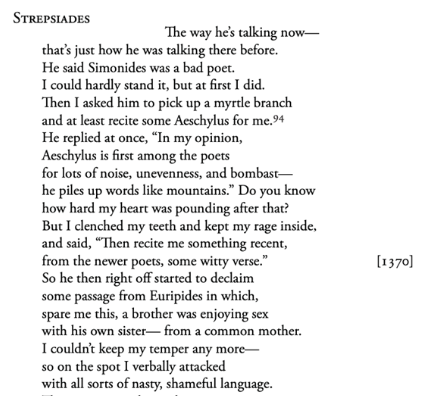
What did Stresiades complain about in his prologue?
In the prologues stresiades complains that his marriage is all that has gone wrong with his life, recalling the prologue of Euripides’ Medea
What is 5th C comedy obsessed with?
5th C comedy is obsessed with tragedy, tragedy has a signinifcant role in all surving comedies
What do we know about Aristophanes (8)?
Little biographical info is known about him
Son of Philippos from a deme
Lived in post periclean athens, when athens fell from and rose against to power
Generally believed, based on his comedies, that he was conservative-leaning.
Debuted his first comedy in 427 BCE (Banqueters), earning second place.
Probably in his 20s when he first wrote Clouds.
Brilliantly successful on the Athenian stage, the greatest comic poet of his generation.
The only poet of Old Comedy with fully extant plays, he wrote approximately 40 plays and 11 survive, plus nearly a thousand fragments. Far larger sample of his plays then most tragic playwrights
What is the most political of Aristophanes plays?
The Clouds
What is the backdrop of the clouds?
Backdrop of war, new forms of education, fundamental questions about ethics and values, sophists, scientific explanations of natural phenomena, even the existence of the gods and the idea of objective knowledge.
What difficult things were happening in society
Ongoing Peloponnesian War – Athens had fallen from wealth, power, and confidence; had survived a plague, Aegean revolts, and diminution of finances. Attica had been devastated by invasions, but at the time of Clouds, the invasions were suspended.
When was the Clouds produced?
First produced in 423 BCE and proved a flop with the audience, coming in third place or worse at the Great Dionysia.
When was the clouds rewritten?
Rewritten and possibly staged again in 419/8 BCE, circulated in manuscript form. We have the revised version.
What is the clouds often identified as?
The clouds is Often identified as a major contributing factor to the vilification of Socrates, culminating in his trial in 399 BCE. and eventual death
What was happenign in Athens in the 420s?
Intellectual fervour of the 420s BCE (especially sophistry and scientific thinking).
What do they say about the sophists in the clouds?
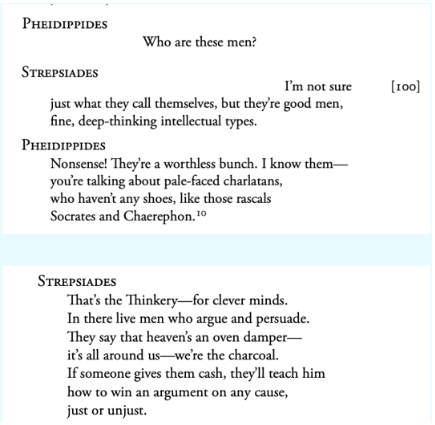
Who were the sophists and what did they do?
All-important context of the sophists, intellectuals of the mid-late 5th century who came to have a negative reputation largely thanks to Aristophanes and Plato.
Offered education for a (large) fee.
What did the sophists challenge?
Challenged established norms and traditions, and controversially taught knowledge rooted in practical skill and scientific knowledge, regardless of ‘morality’.
How does Aristophanes present the Sophists?
Aristophanes presents them as studying natural science, linguistics, rhetoric, maps. Controversial as their teaching was against the moral and civic education typical in Athens
How does Aristophanes portray the Sophists?
Aristophanes portrays the sophists as pallis, scruffy, unkempt, and trivial but the real sophists were itnentionally respected and taught scions of the rich
What were the sophists very interested in?
Rhetoric
Why were people suspicious of the Sophists?
However, there was a popular anxiety about this ‘new’ intellectualism, which led many to be suspicious of the sophists.
Charging fees for education was controversial and led to the belief that sophistic practice stemmed from desire for money rather than for knowledge and virtue.
How does Plato portray the Sophists?
Plato systematically portrays the sophists in a negative light. It is not a reliable source on the sophists
Name a real Sophist:
Protagoras of Thrace, a friend of Pericles, active in the mid-5th century.
What was he known for?
Known for atheism/radical scepticism of the gods and the theory of relativism (‘man is the measure of all things’).
What was his opinion on the gods?
On Gods: ‘Concerning the gods, I have no knowledge of whether they exist or not.’
Visited Athens at least twice.
What did this Sophist claim that is central to Clouds?
Claimed to be able ‘to make the worse argument the better’… Central to the clouds
What happens in lines 112-118 in the Clouds?
Aristophanes aligns Socrates’ style of teaching with Protagorean sophistry.
What do they say in lines 1038 to 1043?
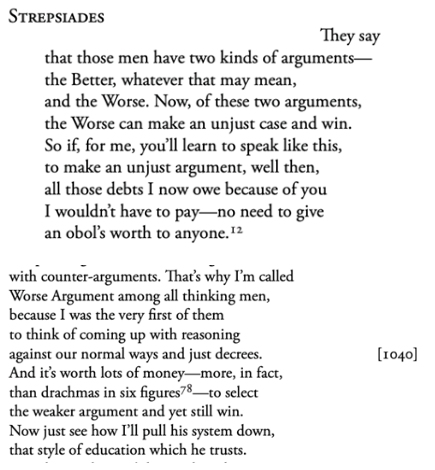
What are Aristophanes Sophists presented as being preocupied with?
astronomy, an interest of pre-Socratic philosophers, e.g. Thales, Anaxagoras, Diogenes. Thales of Miletus’ ideas made their way to Athens a century earlier than Clouds.
Who is Anaxagoras?
Anaxagoras (from Asia Minor) came to Athens in the mid-5th century, also a friend of Pericles.
What did Anaxagoras believe?
He had a complicated theory about matter and the mind (cf. Socrates in his basket, comparing the mind to cress).
Believed that the planets and stars moved throughout the sk due to the rotation of Aether (a deity worshipped by Aristophanes’ Socrates).
Considered eclipses, earthquakes, winds, and thunder as a result of the collision of clouds.
Did Socrates hold these beliefs?
Probably not… Plato presents socrates as mostly being interested in morals
What is Aristophanes socrates’ a portrait of?
Aristophanes’ Socrates is a jumbled type-portrait of the 5th-century sophist-scientist.
Who else parodied the Sophists?
Ameipsias, Trinket (victorious in 423 BCE), with a chorus of sophists, and featured Socrates as a character
Eupolis’ Flatterers, with Protagoras as an ‘impious imposter who makes pretentious statements about the heavens above’
Plato Comicus’ The Sophists, probably with a chorus of sophists
What is a convention in comedy?
To mock prominent individuals
What was this mocked individual called?
This mocked individual was called the komodoumenos ‘one made fun of in comedy’
What is the old oligarch, the constitution of Athens 2.18:
“[The Athenians] do not allow the people to be made fun of in comedy so as to avoid being spoken ill of themselves. But they allow anyone wishing to mock a private individual to do so in the full knowledge that the person mocked is not usually one of the common people or the masses but is rather rich, noble, or powerful. A few of the poor and common people are mocked but only if they engage in public affairs or look to rise above their station in life, so it does not bother them if men like this are made fun of.” (2.18)
When was Socrates put on trial and sentenc ed to death?
399 BC
What did Plato say about Socrates on trial?
“Now let us take up from the beginning the question, what the accusation is from which the false prejudice against me has arisen, in which Meletus trusted when he brought this suit against me. What did those who aroused the prejudice say to arouse it? I must, as it were, read their sworn statement as if they were plaintiffs: ‘Socrates is a criminal and a busybody, investigating the things beneath the earth and in the heavens and making the weaker argument stronger and teaching others these same things.’ Something of that sort it is. For you yourselves saw these things in Aristophanes' comedy, a Socrates being carried about there, proclaiming that he was treading on air and uttering a vast deal of other nonsense, about which I know nothing, either much or little. And I say this, not to cast dishonour upon such knowledge, if anyone is wise about such matters (may I never have to defend myself against Meletus on so great a charge as that!),—but I, men of Athens, have nothing to do with these things.”
What was Socrates accused of?
Socrates was accused of not believing in the gods and inteoducing new deities and of corrupting the young
What lines in the clouds present socrates of comitting these crimes?
In the clouds 364-367:
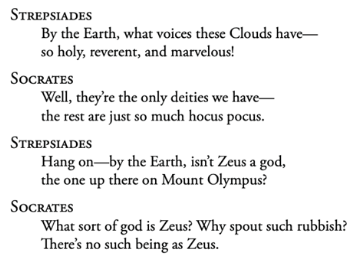
Socrates the caracature:
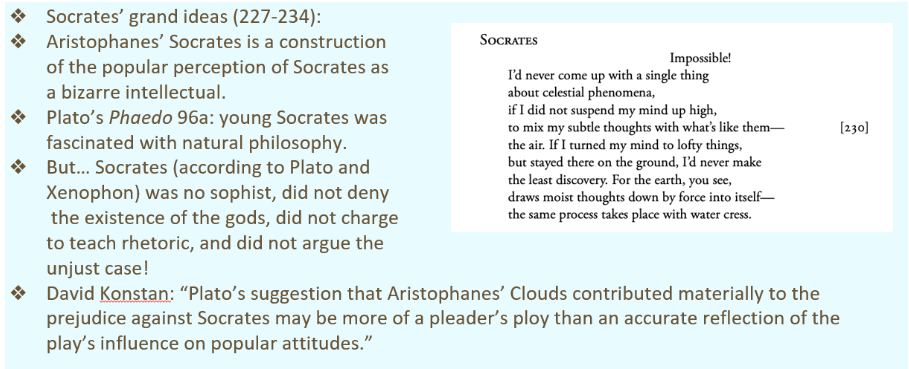
Why was Socrates indicted?
it was far more likely to have done with the radical figures he surrounded himself with
How can we explain he divergence between the Socrates Aristophanes and the Socartes of Plato and Xenophon?
Option 1: Aristophanes portrays the truth through caricature, while Plato and Xenophon are writing fiction.
Option 2: Aristophanes caricatures Socrates as he was in 424/3; Plato and Xenophon portray him as he became in the last 20 years of his life.
Option 3: Plato and Xenophon tell the truth; Aristophanes attaches to Socrates the characteristics which belonged to the sophists in general.
For the parody to be funny, there had to be SOME truth.
MacDowell: “a comic reflection of the man in a distorting mirror, not a picture of a quite different man.”
What is the prologue of the Clouds?
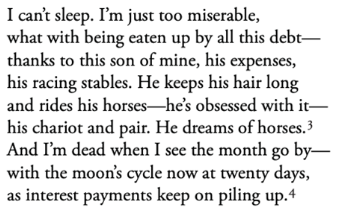
Give context of what is going on in the play at this point:
Strepsiades son Phedidippides has driven him into debt because of his love of horses
Strepsioades wants to send his son to Socrates philosophy school, but his son refuses (line 110-120, shown on powerpoint)
DesperateStrepsiades decided to enrol in the thinkery himself
He is greeted by a strange pupil who treated socrates educational programme as a holy secret (132-143
What happens in lines 132 and 143?
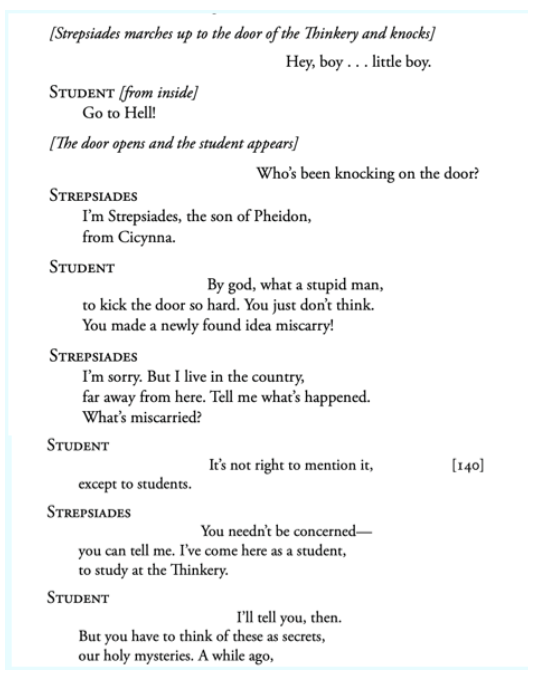
Write notes about this section:
Language of the mysteries, a secretive cult that required an initiation
Socrates as cult leader and goes, a wandering miracle worker, healer and purifier
But Socrates ‘secret’ was trivial, they are wax slippers for a gnat
Write Socrates grand entrance:
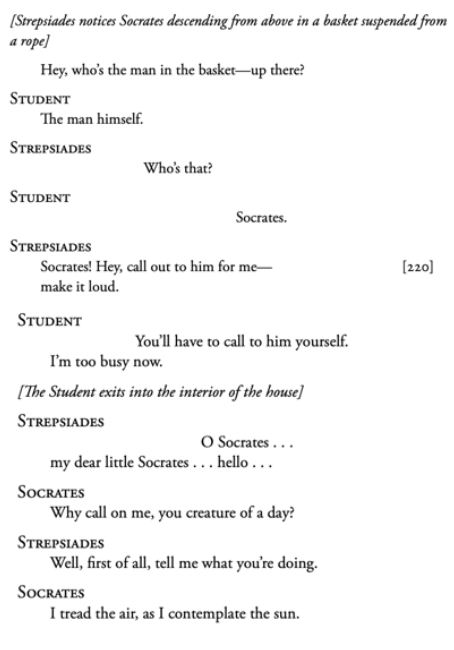
What does his entrance cast him as?
His entrance on the machine casts him as a god
Write down Strepsiades initiation:
What does Socrates make Strepsiades do before he starts teaching?
Before he begins teaching Socrates makes the old man undergo a mock-intitan as if joining a mystic cult. This implies rejection of the cities religion, the text of the play reminds us of the normalcy of the polis that he is abandoning
What does Strepsiades intitiation mimic?
Strepsiaides’ initiation mimics the rites of Corybantic cult, entry to the oracular cave of Trophonius, and initiation into the Eleusinian Mysteries.
What is Strepsiades entrabnce into the thinkery likened to?
A katabasis
What is a katabasis?
a specific type of the famous Hero's journey
What is mysticism associated with?
With Pythagorean brotherhood, which required initiation
What does Platos’ Socrates use the language of?
Initiation
What mjust we question about the chorus?
Why did he chose a chorus of clouds? If this play is about the sophists why not have a chorus of sophists?
What are the reasons for choosing a chorus of clouds?
Socrates’ personal muses, worshipped as deities.
They represent the tension between nature and culture.
What does the chorus say in lines 275-291?
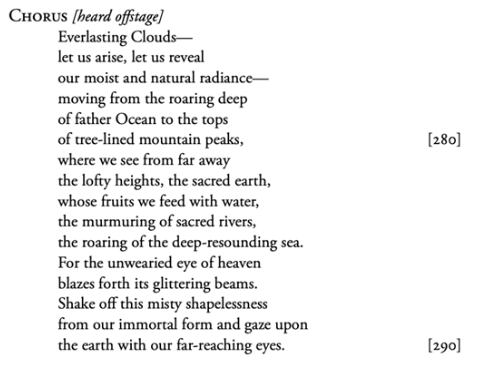
How are the clouds presented as deities?
The clouds replace the Olympian gods for Socrates in line 316-318 (Lines in powerpoint)
The clouds inspire culture int heir worshippers the sophists
They encourage strepsiades education and exert increasign influence on him
They lead him to believe he will learn how to twist the laws and justice
What is the role of clouds in greek literature?
Role of clouds in greek literature- storm in the Odyssey. Stroms motivate the arrival of character is new worlds, storm used in the play Helen by Euripides
How do his lessons at the thinkery begin?
Strepsiades begins lessons, but before he can learn rhetoric he needs to learn musical metre and grammatical gender
Does Strepsiades stay at the thinkery?
Eventually socrates kicks out Strepsiades and Strepsiades begs his son to take his place
What happens in the Parabasis?
Parabasis: the chorus leader addresses the audience on the poor reception of the first version of The Clouds.
Does he return to the Thinkery?
Yes: Strepsiades returns to the Thinkery, determined to enrol Pheidippides
What is an agon?
A debate
Who does the agon occur between?
The debate occurs between two personified arguments, better and worse, who enter squabbling:
Write out this debate:
How is ‘Better argument’ portrayed?
Better argument is portrayed as a pederast and represents the ‘traditional’ values of society:
Give a section in the text where this is shown:
What does the worse argument promise?
Worse argument promises what Strepsiades and Pheidippides came for
Give a section in the text where this is shown: